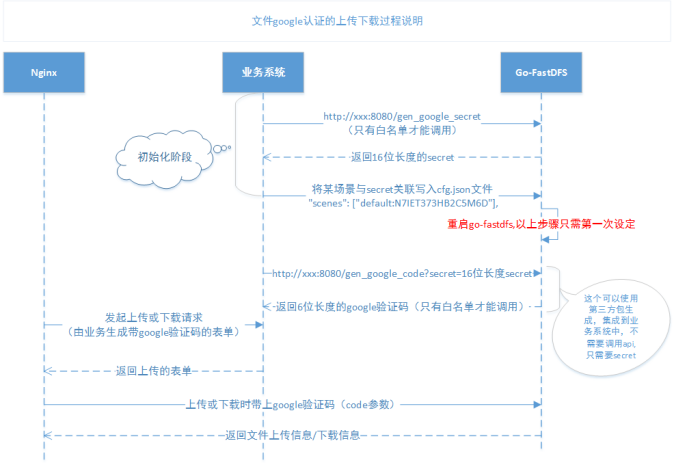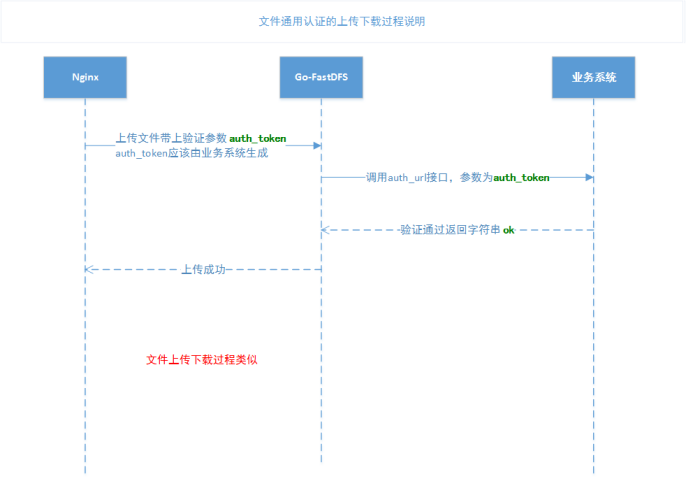简介
go-fastdfs是基于HTTP协议的分布式文件系统,大道至简,运维和扩展更简单,高性能、高可靠、无中心、免维护。
最佳实践
- 海量存储不开启文件token认证功能。
- 尽量标准上传,上传后业务保存Path,在业务使用时再拼接域名。
- 断点续传,上传后要用文件id置换成Path。
- 尽量使用物理服务器部署,主要压力或性能在IO。
- 避免小文件合并,后期无法删除小文件。
- 线上业务尽量使用Nginx+go-fastdfs部署架构(均衡算法使用ip_hash),以满足后面的功能扩展性(nginx+lua)。
集群部署图

海量集群安装
go-fastdfs配置
{
"绑定端号": "端口",
"addr": ":8080",
"是否开启https": "默认不开启,如需启开启,请在conf目录中增加证书文件 server.crt 私钥 文件 server.key",
"enable_https": false,
"PeerID": "集群内唯一,请使用0-9的单字符,默认自动生成",
"peer_id": "0",
"本主机地址": "本机http地址,默认自动生成(注意端口必须与addr中的端口一致),必须为内网,自动生成不为内网请自行修改,下同",
"host": "http://10.0.4.7:8080",
"集群": "集群列表,注意为了高可用,IP必须不能是同一个,同一不会自动备份,且不能为127.0.0.1,且必须为内网IP,默认自动生成",
"peers": ["http://10.0.4.7:8080"],
"组号": "用于区别不同的集群(上传或下载)与support_group_manage配合使用,带在下载路径中",
"group": "group1",
"是否支持按组(集群)管理,主要用途是Nginx支持多集群": "默认支持,不支持时路径为http://10.1.5.4:8080/action,支持时为http://10.1.5.4:8080/group(配置中的group参数)/action,action为动作名,如status,delete,sync等",
"support_group_manage": true,
"是否合并小文件": "默认不合并,合并可以解决inode不够用的情况(当前对于小于1M文件)进行合并",
"enable_merge_small_file": false,
"允许后缀名": "允许可以上传的文件后缀名,如jpg,jpeg,png等。留空允许所有。",
"图片是否缩放": "默认是",
"enable_image_resize": true,
"图片最大宽度": "默认值2000",
"image_max_width": 2000,
"图片最大高度": "默认值1000",
"image_max_height": 1000,
"extensions": [],
"重试同步失败文件的时间": "单位秒",
"refresh_interval": 1800,
"是否自动重命名": "默认不自动重命名,使用原文件名",
"rename_file": false,
"是否支持web上传,方便调试": "默认支持web上传",
"enable_web_upload": true,
"是否支持非日期路径": "默认支持非日期路径,也即支持自定义路径,需要上传文件时指定path",
"enable_custom_path": true,
"下载域名": "用于外网下载文件的域名",
"download_domain": "",
"场景列表": "当设定后,用户指的场景必项在列表中,默认不做限制(注意:如果想开启场景认功能,格式如下:'场景名:googleauth_secret' 如 default:N7IET373HB2C5M6D ",
"scenes": [],
"默认场景": "默认default",
"default_scene": "default",
"是否显示目录": "默认显示,方便调试用,上线时请关闭",
"show_dir": false,
"邮件配置": "",
"mail": {
"user": "abc@163.com",
"password": "abc",
"host": "smtp.163.com:25"
},
"告警接收邮件列表": "接收人数组",
"alarm_receivers": [],
"告警接收URL": "方法post,参数:subject,message",
"alarm_url": "",
"下载是否需带token": "真假",
"download_use_token": false,
"下载token过期时间": "单位秒",
"download_token_expire": 600,
"是否自动修复": "在超过1亿文件时出现性能问题,取消此选项,请手动按天同步,请查看FAQ",
"auto_repair": true,
"文件去重算法md5可能存在冲突,默认md5": "sha1|md5",
"file_sum_arithmetic": "md5",
"管理ip列表": "用于管理集的ip白名单,如果放开所有内网则可以用 0.0.0.0 ,注意为了安全,不对外网开放",
"admin_ips": ["127.0.0.1"],
"是否启用迁移": "默认不启用",
"enable_migrate": false,
"文件是否去重": "默认去重",
"enable_distinct_file": true,
"是否开启跨站访问": "默认开启",
"enable_cross_origin": true,
"是否开启Google认证,实现安全的上传、下载": "默认不开启",
"enable_google_auth": false,
"认证url": "当url不为空时生效,注意:普通上传中使用http参数 auth_token 作为认证参数, 在断点续传中通过HTTP头Upload-Metadata中的auth_token作为认证参数,认证流程参考认证架构图",
"auth_url": "",
"下载是否认证": "默认不认证(注意此选项是在auth_url不为空的情况下生效)",
"enable_download_auth": false,
"默认是否下载": "默认下载",
"default_download": true,
"本机是否只读": "默认可读可写",
"read_only": false,
"是否开启断点续传": "默认开启",
"enable_tus": true,
"同步单一文件超时时间(单位秒)": "默认为0,程序自动计算,在特殊情况下,自已设定",
"sync_timeout": 0
}
Nginx配置
worker_processes auto;
events {
worker_connections 1024;
}
http {
include mime.types;
default_type application/html;
log_format main '$remote_addr - $remote_user [$time_local] "$request" '
'$status $body_bytes_sent "$http_referer" '
'"$http_user_agent" "$http_x_forwarded_for"';
access_log /var/log/nginx/access.log main;
error_log /var/log/nginx/error.log error;
sendfile on;
keepalive_timeout 65;
rewrite_log on;
client_max_body_size 0;
proxy_redirect ~/(\w+)/big/upload/(.*) /$1/big/upload/$2; #继点续传一定要设置(注意)
#以下是一下横向扩展的配置,当前统一大集群容量不够时,只要增加一个小集群,也就是增加一个
#upstream ,一个小群集内按业务需求设定副本数,也就是机器数。
upstream gofastdfs-group1 {
server 10.1.51.70:8082;
#server 10.1.14.37:8082;
ip_hash; #notice:very important(注意)
}
upstream gofastdfs-group2 {
server 10.1.51.70:8083;
#server 10.1.14.36:8083;
ip_hash; #notice:very important(注意)
}
server {
listen 8001;
server_name localhost;
if ( $request_uri ~ /godfs/group ) {
# 注意group会随组的前缀改变而改变
rewrite ^/godfs/(.*)$ /$1 last;
}
location ~ /group(\d) {
#统一在url前增加godfs,以便统一出入口。
proxy_set_header Host $host;
proxy_set_header X-Real-IP $remote_addr;
proxy_set_header X-Forwarded-For $proxy_add_x_forwarded_for;
proxy_pass http://gofastdfs-group$1;
}
location ~ /godfs/upload {
#这是一个横向扩展配置,前期可能只有一个集群group1,当group1满后,只需将上传指向group2,
#也就是将rewrite , proxy_pass 中的group1改为group2即可。
proxy_set_header Host $host;
proxy_set_header X-Real-IP $remote_addr;
proxy_set_header X-Forwarded-For $proxy_add_x_forwarded_for;
rewrite ^/godfs/upload /group1/upload break;
proxy_pass http://gofastdfs-group1;
}
location ~ /godfs/big/upload {
#以上上类似。
proxy_set_header Host $host;
proxy_set_header X-Real-IP $remote_addr;
proxy_set_header X-Forwarded-For $proxy_add_x_forwarded_for;
rewrite ^/godfs/upload /group1/big/upload break;
proxy_pass http://gofastdfs-group1;
}
}
}
认证
Google认证码认证

用户自定义认证

示例:
-
安装依赖包
pip install flask requests -
启动认证服务
from flask import Flask,request app = Flask(__name__) @app.route('/',methods=["GET", "POST"]) def index(): auth_token = request.form.get("auth_token") # check auth_token here print(auth_token) if auth_token=='abc': return 'ok' #success else: return 'fail' if __name__ == '__main__': app.run(host='0.0.0.0',debug=True)python app.py
-
配置认证url “auth_url”: “http://127.0.0.1:5000”
-
上传示例
import requests url = 'http://10.1.5.9:8080/group1/upload' files = {'file': open('report.xls', 'rb')} options={'output':'json','path':'','scene':'','auth_token':'abc'} #参阅浏览器上传的选项 r = requests.post(url,data=options, files=files) print(r.text)